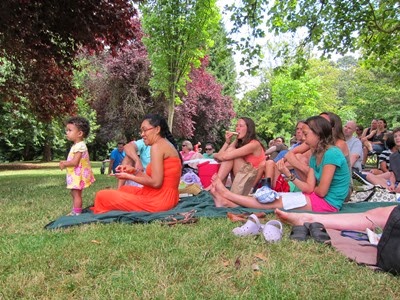~
Whole Lotta Shakespeare Going On
Lois Leveen
I've spent the last couple of years in isolated obsession with the Bard. My new novel, Juliet's Nurse, imagines the fourteen years leading up to the events in Romeo and Juliet, as told by the character who has the third largest number of lines in William Shakespeare's play. Although much of my research focused on fourteenth-century Italy (in which the novel is set), I always kept my edition of Romeo and Juliet within arm's reach while writing, so I could cull from the characters, lines, settings, and scenes Shakespeare provided. Yet even as I wove material from Shakespeare throughout the novel, I was careful to craft Juliet's Nurse so that a reader wouldn't need to know anything about the play to enjoy the book. After all, I thought, Shakespeare can seem daunting, and I didn't want readers to be intimidated.
But a funny thing happened once the novel was done: I looked up from my manuscript, broadened my focus beyond my own copy of Romeo and Juliet, and suddenly realized Shakespeare was everywhere. Visiting the Helsinki City Museum shop, I happened upon a graphic novel version of Romeo and Juliet. Watching the 1960s TV sitcom The Odd Couple, I recognized three Shakespeare allusions in two episodes. While a professor friend and I sat discussing Shakespeare in the Chinese garden in downtown Portland, Oregon, passersby who overheard us kept stopping to share stories about particular Shakespeare productions they'd seen, or to advocate for characters who were their personal favorites. When I read from Juliet's Nurse at a small cabaret-style gathering last spring, the woman whose turn onstage came after mine responded by reciting from memory the entire Shakespeare scene I'd riffed on. Soon other performers and audience members began offering Shakespeare lines and speeches that they knew by heart.
 |
| Romeo & Julia - Finnish graphic novel (credit: Lois Leveen) |
Perhaps the most serendipitous Shakespeare concurrence for me is the Complete Works Project. Seventeen theater companies in the city where I live—ranging from the most established performing arts venues to shoestring-budget groups who perform wherever they can find space—have committed to staging every Shakespeare play within two years. This feat requires an intense level of coordination across organizations, for a period stretching from April 2014 (the 450th anniversary of Shakespeare's birth) through April 2016 (the 400th anniversary of his death). Thanks to their efforts, this summer I was attending as many as four plays a week, including many I'd never seen or read before, and others I hadn't been exposed to in years.
As a writer who'd been riffing on a single Shakespeare play, watching so many of his works was revealing. His plots can be convoluted, and his characters sometimes have abrupt changes of heart that challenge believability. But his language – line after line that are so beautiful, biting, witty, memorable! Turns out, we all know more Shakespeare than we realize, because he shaped the English language in profound ways. But what impressed me most were the audiences, particularly at the many free performances put on in parks across the city.
 |
| One park, two plays, many Portlanders atttending (credit: Lois Leveen) |
Children under the age of two remained mesmerized for three hours. Teens skateboarding by stopped to watch. An older couple walking past with their Labrador retriever lingered until the dog got restless, then returned twenty minutes later without the dog to catch the final act. (Other dogs sat happily through entire performances). Technically, we were all groundlings, but the viewers sporting an array of tattoos, mohawks, and body piercings cheek-by-jowl with those who had wheelchairs, walkers, or bottles of expensive Chardonnay nestled within high-end picnic baskets testified to the Bard's astoundingly broad appeal. I was especially impressed at how the actors handled lines that strike audiences today as misogynistic, anti-Semitic, or racist; to admire and love Shakespeare doesn't mean we should ignore what he got wrong.
 |
| Portland families, mesmerized by William Shakespeare (credit: Lois Leveen) |
Recognizing the ubiquitous appeal of Shakespeare was reassuring to me as I waited for Juliet's Nurse to be released. In the months to come, I'll have the chance to talk about his work, and how it influenced me, with readers around the world. One city has already chosen the book for its Community-Wide Read, timed to coincide with Valentine's Day – a perfect season for re-examining the world's most famous love story. But the library director and I are planning a series of events that extend well beyond the conventional "Why I Wrote This Book" author talk. There will be a program about medieval and Renaissance Italian art and architecture, a mother-daughter reading group, classroom writing workshops for high school and college students and teachers, perhaps a session in which actors coach community members as they take their turn at speaking Shakespeare's lines—and my own. It's always a thrill for me to engage audiences in discussions about themes like love, loss, suffering, and hope that run through my novels. But it's especially exciting to bring new perspectives to cultural conversations we're already having, thanks to Shakespeare.
I'm delighted to be reminded in so many ways that Shakespeare can be inviting, rather than intimidating. Finding so much Shakespeare in the world around me provides an important lesson about not writing off anyone's ability to appreciate his work, or mine.
Author bio:
 |
| Author Lois Leveen (Credit: John Melville Bishop) |





No comments:
Post a Comment